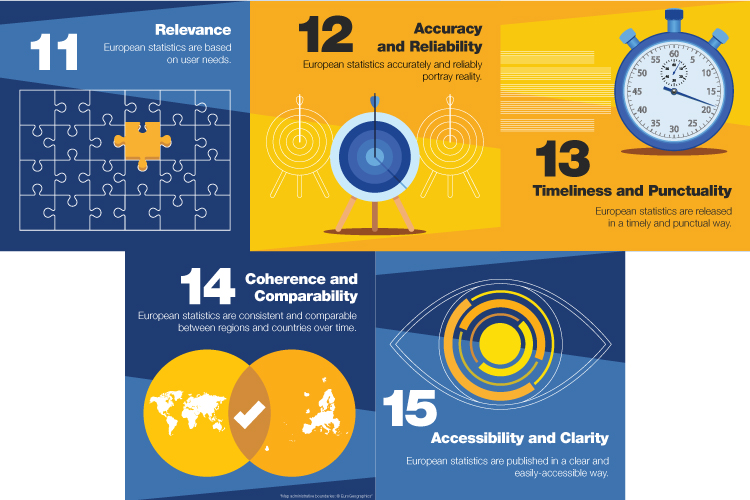Principles of the European Statistics Code of Practice
Principles of the European Statistics Code of Practice
The European Statistics Code of Practice (the Code) is the basis of the common quality framework of the European Statistical System (ESS). It is an autonomous instrument based on 16 principles, which cover the institutional environment, statistical production processes and statistical results. These principles are the basis of the ESS quality framework, and the Code sets standards for the development, production and dissemination of European statistics.
The Code was first adopted in 2005, and revised in 2011 and 2017. Principle 1.a was developed in 2017 to cover coordination and cooperation within national statistical systems and within the ESS.
The purpose of the 2017 edition of the Code is to reflect the latest changes and innovations in the development, production and dissemination of official statistics in the European Statistical System and beyond, such as the emergence of new data sources, the use of new technologies, the modernisation of the legal framework and the production of statistics.
Institutional Environment
Institutional and organisational factors have a significant influence on the effectiveness and credibility of a statistical authority developing, producing and disseminating European statistics. The relevant Principles are professional independence, coordination and cooperation, mandate for data collection and access to data, adequacy of resources, commitment to quality, statistical confidentiality and data protection, impartiality and objectivity.

Statistical Processes
European and other international standards, guidelines and good practices are fully observed in the statistical processes used by the statistical authorities to develop, produce and disseminate European Statistics, while constantly striving for innovation. The credibility of the statistics is enhanced by a reputation for good management and efficiency. The relevant Principles are sound methodology, appropriate statistical procedures, non-excessive burden on respondents and cost effectiveness.

Statistical Output
Available statistics meet users’ needs. Statistics comply with the European quality standards and serve the needs of European institutions, governments, research institutions, business concerns and the public generally. Output quality is measured by the extent to which the statistics are relevant, accurate and reliable, timely, coherent, comparable across regions and countries, and readily accessible to users.
